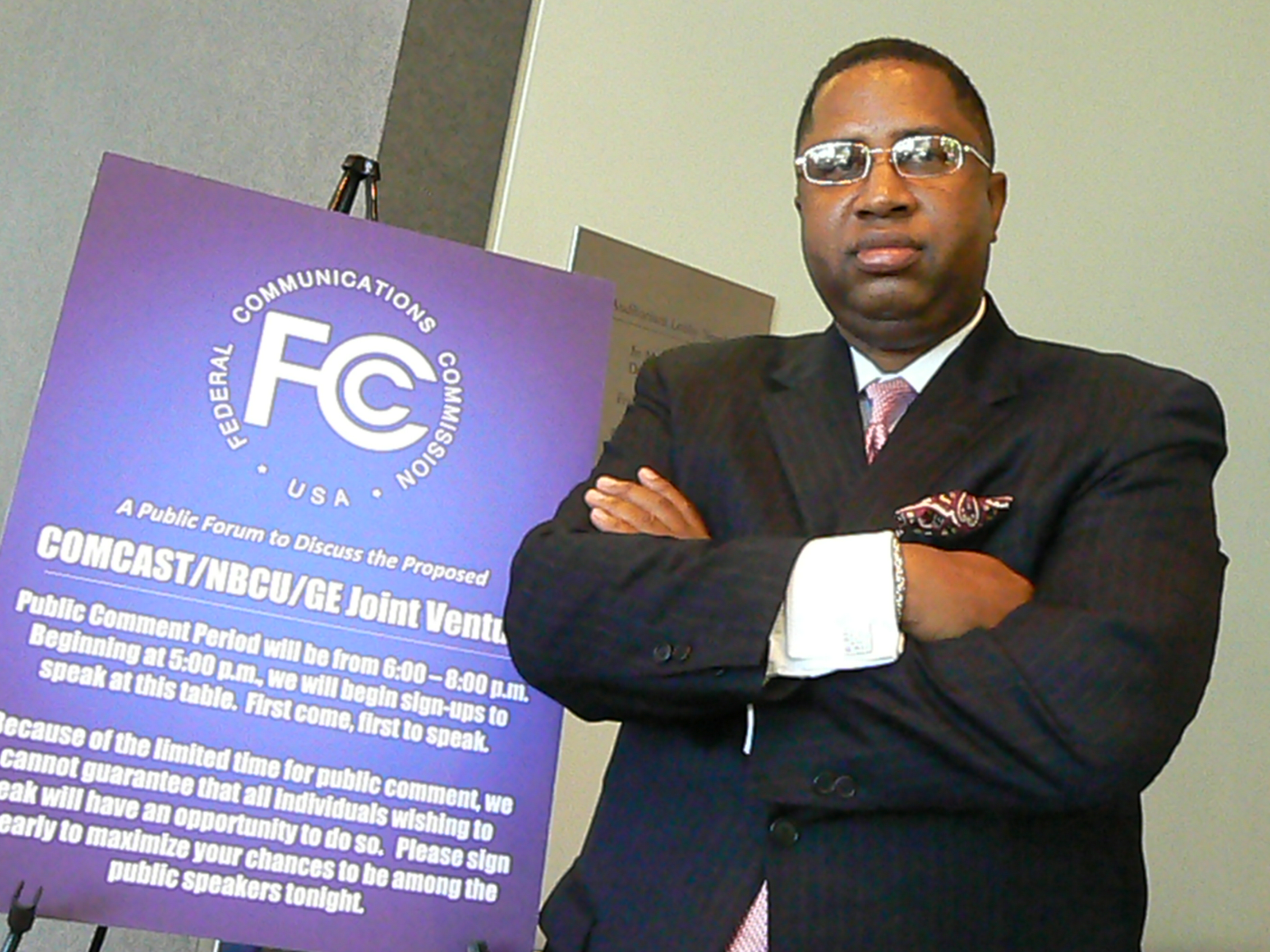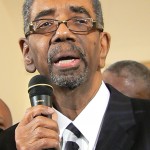by La Risa Lynch
The proposed merger between Comcast and NBC-Universal will create the nation’s biggest media entity putting hundreds of cable channels, local broadcast stations and internet service under the control of one company.
That concerns media analysts and activists, who contend the merger would hinder fair competition and limit content. But for one Los Angeles-based advocacy group the proposed merger may have a broader impact for Black viewers.
The National Coalition of African-American Owned Media or NCAAOM wants more Black-owned channels as part of the proposed merger if approved by federal regulators. The Federal Communications Commission (FCC) must approve the $30 billion marriage between Comcast and NBC-Universal.
“We think that it is appalling … when you look at the ownership model that Comcast has that there is not one independently owned, wholly owned, 100-percent owned African-American channel on their platform,” NCAAOM’s head Stanley Washington said.
NCAAOM wants Comcast to set aside at least 50 channels or 10 percent of Comcast’s 500 channels to be solely owned by Blacks. Additionally, the group wants independent ownership of content on the NBC-Universal side of the deal. NCAAOM seeks at least four hours of prime time as week targeted to African-American viewers.
Washington said NBC-U doesn’t have any African-American owned production company. NBC Universal owns 34 TV stations nationally and 13 cable networks, including USA, CNBC, MSNBC, Syfy, Bravo and Oxygen.
The idea is about Blacks controlling their image, Washington explained.
“We are not at the table when decisions are being made around who we are and how we are being stereotyped,” Washington said. “In order to solve that, you got to have ownership, and you got to have control over how those images being distributed.”
He called the matter one of simple economics. He noted much of Comcast success stems from its penetration in large urban markets heavily populated by African-Americans.
Comcast generate $36 billion annually from its 25 million subscribers. NCAAOM estimates African-Americans comprise 40 percent of Comcast customers generating half of its revenue.
Black subscribers contribute $15 billion to Comcast’s bottom line, and that money “is not touching any of our hands,” Washington said. Allowing Blacks channel ownership on Comcast’s platform provides an opportunity to “grow our own economic wealth,” he noted.
The group’s position of 100-percent Black-owned channels has met with criticism. Opponents, Washington contends, argue Blacks lack capacity to establish cable channels without outside investments.
That argument is flawed, he said, noting that there are numerous companies and individuals, like filmmaker Tyler Perry, who have grown their business organically and are multi-millionaires.
Reliance on private equity lessens a Black business’s chance to grow and sustain themselves long term, Washington contends. If a Black business doesn’t make a return on a investor’s investment, they can sell it to someone else, he explained.
“You want over time to create a sustainable environment where African-Americans own what they have and continue to own it,” he said.
Comcast works contrary to that, Washington said. He noted the company often seeks an equity in a channel in order for Comcast to carry it. NCAAOM wants unencumbered Black ownership of channels.
He said the Black Family Channel folded after its investors refused to give up equity. A bevy of entertainment heavy hitters financed the channel. They included attorney Willie Gary, boxer Evander Holyfield, baseball player Cecil Fielder and Marlon Jackson, brother to the late Michael Jackson.
The Black Family Channel’s Alvin James said Comcast created TV-One as a competitor and positioned the station in better markets. That affected his channel’s ability to get advertisement. The channel folded fives years after it aired in November 1999. Comcast and DirecTV have a stake in TV-One, which launched in 2004.
Comcast denies seeking equity in the Black Family Channel.
“That’s not true,” Comcast’s Payne Brown said. Brown, vice president of strategic initiatives, contends it is a fallacy to think something is not Black owned if it is not 100 percent Black owned.
Brown also called it “disingenuous” to tell Blacks they cannot seek venture capital funds, even though government officials fought to give Blacks greater access to capital.
However, Brown reaffirmed his company’s commitment to diversity that, he said, goes beyond channels and programming.
The company proposes:
- To create a $20 million venture capital fund to expand opportunity for minorities to develop new media content.
- To increase minority talent both on and off the air.
- To create opportunities for Black ownership of on-demand programming, such as Hip Hop on-demand, co-created by rap mogul Russell Simmons.
- To set aside four out of ten new independently owned and operated channels to Blacks.
James, of the Alvin James Group, a media consultant company, supports NCAAOM ownership position.
“When you have other people who don’t understand our culture, they tend to compromise it in a very significant way, and it loses it’s validity,” said James, a 25-year veteran in the cable industry.
NCAAOM’s position of 100-percent ownership is gaining traction.
FCC Chairman Michael J. Copps noted that the number of minority and women-owned media companies don’t reflect this nation’s population.
Minorities comprise 34 percent of the nation’s population, but only have 3.15 percent of commercial TV stations. Women make up 51 percent of the population, yet own 5.8 percent of the TV stations.
“Shortchanging ownership diversity is shortchanging our civic dialogue,” Copps said.
The emergence of cable gave civil rights organizations hope that the industry would allow for minority ownership, programming and staffing, said the Rev. Jesse Jackson, founder of Rainbow/PUSH Coalition. That has not happened.
“The FCC must make sure that there’s a fair and enforceable process that ensures Comcast carries independent networks and programs …,” Jackson said.
Congressman Bobby Rush, who sponsored s July 8th hearing in Chicago on the merger, said he knows of Comcast’s diversity commitments. But he added they don’t go far enough for a merger that will create a “colossus” media and information company.
“If this merger is truly going to be in the public interest Comcast and NBC-Universal will have to do more for and with minorities than what have offered to do,” he added.
Washington agreed. He said Comcast’s diversity goals must go beyond the obvious.
“Comcast is more than willing to talk about employee diversity,” he said. “They want to talk about supplier diversity and … board seats. But what they don’t want to talk about is revenue ¾ the economic value of what they are taking out.”


Be the first to comment on "Comcast-NBC-Universal merger deal should include Black channel ownership"